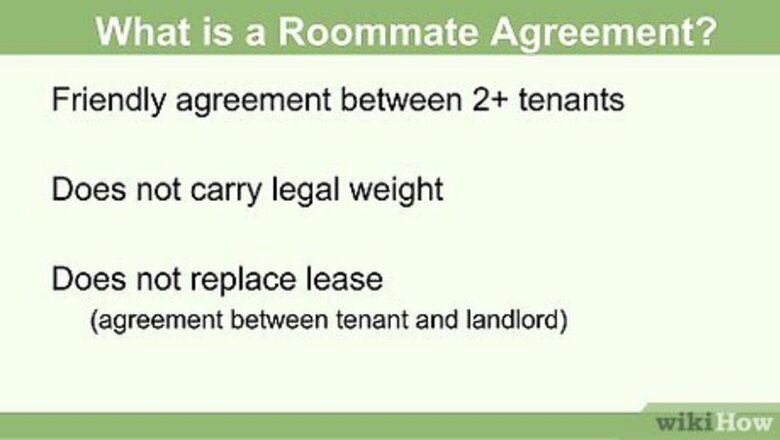
views
Understanding the Purpose of a Roommate Agreement
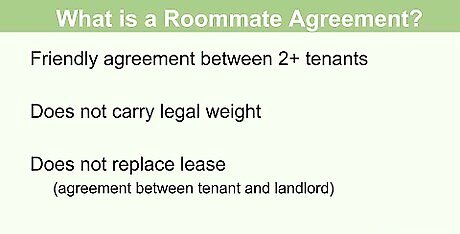
Recognize the difference between a lease and a roommate agreement. Before you sit down with your roommate to draft and sign a roommate agreement, it’s important that you both understand a roommate agreement is separate from your lease. A lease is a legal relationship between the tenants and the landlord. A roommate agreement is a relationship between the individual tenants and is not considered a legally binding document. Instead, a roommate agreement will allow you and your roommate to agree on the terms of living with each other. You can use the roommate agreement as a reference if there is a dispute between you and your roommate. But the roommate agreement cannot be used in court to collect overdue rent. Your lease can be used in court during an eviction lawsuit for overdue rent. It is usually not possible to have more than one tenant name on the lease. Discuss the legal implications of this with your roommate before you sign the lease.

Make sure you are both willing to commit to a roommate agreement. You and your roommate should understand that the rules and terms of the agreement are not legally binding, but they should be followed in good faith. The agreement will help make your living conditions clear and amicable. The terms in the agreement should be followed by both of you whenever possible. If a dispute arises, or a conflict, be sure to discuss it together and edit or adjust the roommate agreement if needed.
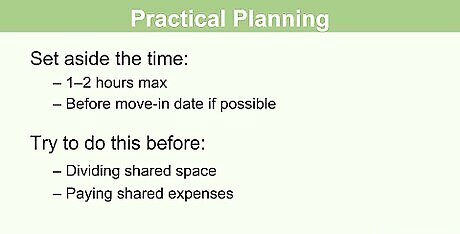
Sit down together and draft an agreement. Set aside one to two hours of time, before moving day, or within a few days of moving in together, to draft the roommate agreement together. This will ensure you both have a say in the agreement and are clear on the rules and terms of the space. If possible, sign the lease and the roommate agreement at around the same time. This will help you start your roommate relationship on the right foot and hopefully prevent any conflicts or disputes in the future.
Drafting the Roommate Agreement
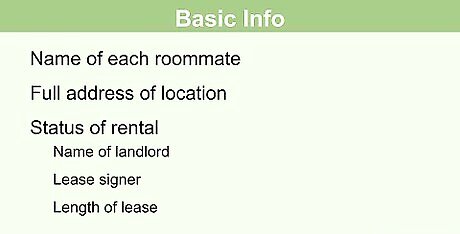
State your names and the address of the residence. Start the agreement by writing the names of both roommates and the complete address of the residence, including the unit number of the apartment if you are living in an apartment building.
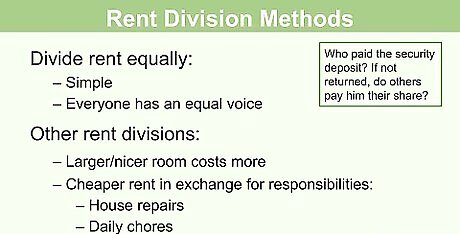
Agree on the division of the rent payment. Specify the exact amount of rent each roommate will pay each month. This could be an equal division of the total rent, for example, $1400/2, so $700 each a month. You and your roommate may agree to a different arrangement if your roommate has a bigger room in the residence. The roommate with the larger room may pay more rent than the roommate with the smaller room. Write down the amount of rent each roommate will pay for the duration of the lease. This will ensure there will be no confusion at the end of the month when rent is due. You should also include a note about the security deposit for the residence and the amount of the security deposit. In most cases, the security deposit is the total rent amount for the residence. Write down if one roommate or both roommates paid the security deposit and how much each roommate paid. This will make it easier to divide the security deposit among you and your roommate once you both move out of the residence and get the deposit back from your landlord.
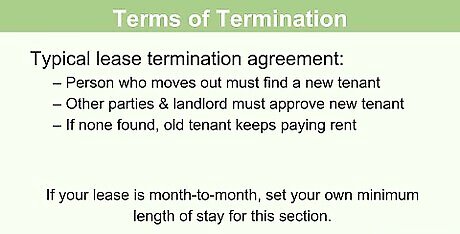
Note what happens if one roommate wants to terminate the lease. If your roommate wants to move out before the end of the lease, you should specify if it is her responsibility to find a new roommate for the residence. You should also note if your roommate will be responsible for paying rent until she finds a new roommate, even if she has already moved out. This will protect both of you from having to shoulder the full rent amount on your own if either of you moves out suddenly or wants to break the lease. Make a note in the agreement that all roommates must approve the replacement roommate before they can move in and take the departing roommate’s space. Most landlords require their tenants to notify them of all new roommates before the new roommate moves in, and must approve of the new roommate.
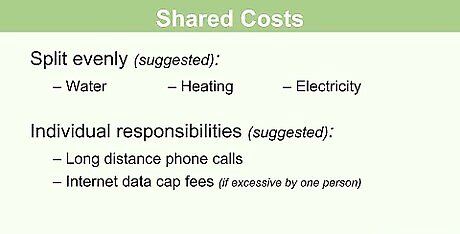
Specify the monthly amount for utility charges. Write down the percentage of the utility bills each roommate will pay. Utilities could include heating (gas), water, and electricity, or just electricity if heating and water is included in your rent payment. If you and your roommate are splitting the utilities equally, each of you would pay 50% of the amount. Write down the monthly amount on the agreement so it is clear what is owed at the end of each month. You should also note how much each roommate is paying for cable/internet/phone (if there is a landline). Usually cable or internet is in one roommate’s name and the other roommate pays their roommate a certain amount each month. Write down the amount to be paid to roommate #1 by roommate #2 for cable/internet and the date this will be paid (usually the last day of the month).
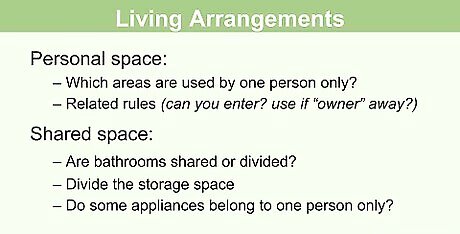
Outline the living arrangements. Note how the bedrooms in the space are going to be allocated. For example, roommate #1 gets the first bedroom and roommate #2 gets the second bedroom. You should then note the common areas in the residence. For example, the bathroom is shared, the kitchen is shared, and the living room is shared. If there are shared appliances in the kitchen, you should also include them in the roommate agreement. If there are any areas that are off limits to a roommate, note these in the agreement. For example, you may want to use a spare room as your office. This would be a private space and not shared by you and your roommate.
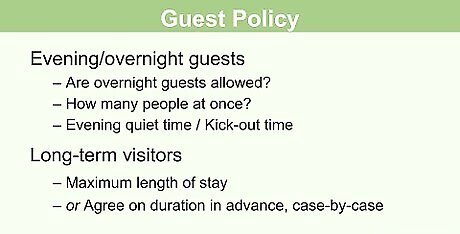
Agree on the rules for overnight guests, or visiting guests. One of the biggest potential sources of conflict for roommates, beside late rent payments, are the rules around guests staying in the residence. Discuss if overnight guests are allowed in the residence and if so, how long the guest can stay at the residence. For example, you and your roommate may agree on one night maximum for overnight guests. You should also include a note about visiting guests such as out of town visitors or family members. Note how long the visiting guest can stay at the residence, or agree to treat each visiting guest on a case by case basis. You may include a provision that both roommates have to agree on the duration of the visit before the visitor arrives.
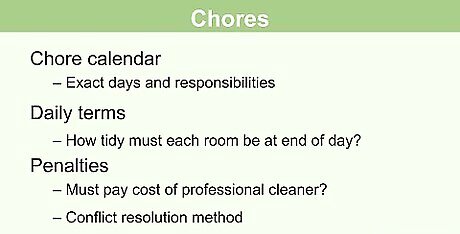
Divide the household chores and cleaning duties. Make a list of all household chores and duties in the residence, and divide them among you and your roommate. Most chores will be in shared spaces like the kitchen and the bathroom. Be as specific as necessary about the division of the household chores and duties to prevent any conflicts in the future. You and your roommate may want to create a cleaning schedule where you alternate the cleaning of the kitchen and the bathroom, as well as taking out the garbage and the recycling. You may both agree to maintain the living room by tidying throughout the day, and to always wash your dishes after you finish cooking a meal in the shared kitchen.

Note the rules around alcohol, smoking, and parties or entertaining in the residence. Specify if drinking is allowed in the residence, and if smoking is allowed in the residence. Keep in mind most landlords do not allow smoking in the building and may withhold the security deposit if they find out you or your roommate smoked in the residence. As well, you and your roommate should discuss the rules around entertaining and having parties in the residence. Your roommate may need to get up early on Saturdays for a job, for example, so you may both agree to gatherings at the residence up until 10 pm on Friday nights. You may then need to leave the residence to continue partying so your roommate can get a good night’s sleep. Some landlords frown on noise after 10 pm in the residence, so keep this in mind when you are drawing up the rules around entertaining and parties.

Add any additional notes, specific to the residence. If your residence comes with a parking spot, you and your roommate should discuss if you will rotate using the parking spot or if only one of you will use the parking spot. As well, if one or both of you have pets (and pets are allowed in the building), agree to both clean up after your pets. You should both be responsible for your own pets, especially if they will be living in the shared areas of the residence.
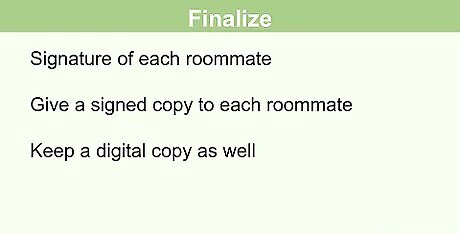
Sign the agreement and make copies for each roommate. Once you have drawn up the agreement, preferably typed up on the computer, print it off. Read over the agreement before you sign it to ensure you have covered everything. Scan or photocopy the original signed document, or print two copies and sign them both. You and your roommate should each have a signed copy of the roommate agreement, in case of a dispute or conflict.




















Comments
0 comment